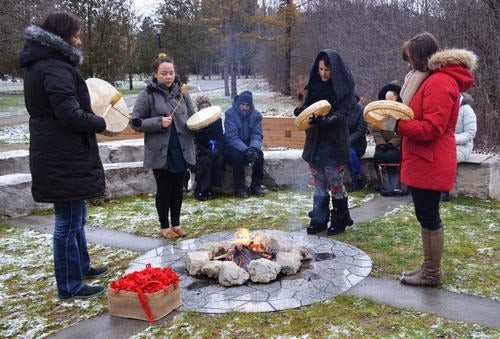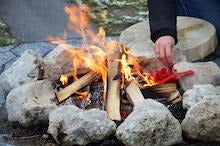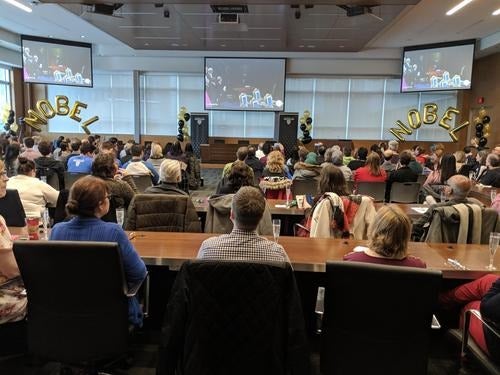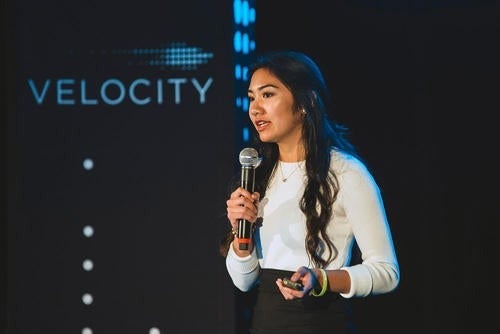Editor:
Brandon Sweet
University Communications
bulletin@uwaterloo.ca
Ceremonial Fire Grounds offer a space for learning and reconciliation

By Wendy Philpott, Faculty of Arts. This article was also published on the Faculty of Arts news site.
On a wintry morning two weeks ago, students, staff and faculty gathered around the Ceremonial Fire Grounds beside Laurel Creek for the opening of Bridge: Honouring the Lives of Missing and Murdered Indigenous Women, Girls, and Two Spirit People (MMIWG2S). The sacred fire site now plays a vital part in the Bridge initiative — and Bridge is now a key action in the 16 Days of Activism Against Gender-based Violence campus campaign.
Led by the Waterloo Indigenous Student Centre (WISC), Al MacDonald, a Fire Keeper for the site, Professor Sorouja Moll, as well as the Indigenous Students Association, the Bridge ceremony focused on offering strips of red fabric into the fire, each with the name of one of the estimated 4,000+ missing and murdered written on them. During 16 Days 2017, these fabric strips were tied to the bridge between EV3 and St Paul’s.
“As we burned the ties from last year, we sang three prayer songs,” says Lori Campbell, Director of WISC. “The first was a strong woman song, the second a child’s lullaby, and the third, a 2 Spirit song.” WISC students and staff also opened the gathering with the Mohawk Friendship welcome, which will be familiar to a growing group on campus who join events such as the Indigenous Speakers Series.
“For me, offering the red fabric with names of MMIWG2S into the sacred fire is very important work because I believe that as the fabric burns, my prayers for them and their families go into the smoke and is carried up to Creator,” says Stephanie Marr, a fourth-year student in biomedical sciences and member of the Indigenous Students Association. “I pray that those who are missing are found, that those who were murdered rest easy, and that all of their spirits are safe now with Creator. I also pray for their families and that they receive closure and peace.”
The Bridge installation creates a space for all University community members to learn about the crisis of the murdered and missing, as they write a name on red fabric, tie it to the bridge and reflect on how we as a country can do better. Moll initiated the project 10 years ago when she questioned the reported statistic of murdered and missing Indigenous women and girls. Four years ago, she collaborated with WISC for 16 Days to bring the initiative to this campus. “The project has now evolved into a community-based relationship involving activism, knowledge sharing, and remembrance,” says Moll. “When my students ask me ‘what can I do?’ it's important that I not only tell them, but show them through practice.”

MacDonald added tobacco to the flames as the ties of 2017 were offered into the fire by Marr, Campbell, Heather George (PhD candidate in History), and Cheryl Maksymyk (Indigenous Student Services Coordinator). At the same time, Moll and her students moved to the bridge to begin tying this year’s named strips of red fabric, a process that continued over the 16 Days 2018 campaign.
Officially opened last June on National Indigenous Peoples Day, the Ceremonial Fire Grounds and Medicine Garden are spaces for Indigenous students, staff, and faculty to feel safe, create community, and feel supported, says Campbell. Secondarily, the grounds “engage with our non-Indigenous peers who may come out to support us or who may come to learn from us.” For example, when Campbell taught The Indigenous Experience in Canada course, she held some of the classes at the Ceremonial Fire Grounds. “I have also used the space to teach, or guest lecture, for other classes on campus. And other faculty members have brought their classes to the space to learn.”
Most importantly, says Campbell, “I want the UW campus community to know that it is a sacred space that is open for all. It can be a place to have some quiet meditative time, or to join with us to learn about Indigenous cultures. I do, however, ask folks to be mindful that the Ceremonial Fire is different from a regular fire.” Staff and students of WISC are the caretakers of the space, along with MacDonald, and they facilitate its programming and specific protocols.
For Marr, who is Ojibway, caribou clan, the Ceremonial Fire creates opportunity to reflect and honour her own family. “Both of my maternal grandparents went to residential school and my mother is a 60s scoop survivor,” she says. “I have a family member who is on the list of MMIWG2S, so it was important for me to write her name on the red fabric and tie it on the bridge. My prayers that I offered when burning the red ties usually include her, but it is easy for me to extend my prayers to all MMIWG2S because they feel like family as well.”
Waterloo celebrates as Donna Strickland accepts Nobel Prize in Physics

It was a full house at the Nobel Prize viewing party yesterday with standing-room only by the time the livestream began at 10:30 a.m. Faculty, staff, students, members of the community and local media gathered in Needles Hall to watch as Professor Donna Strickland accepted her Nobel Prize in physics in Stockholm, Sweden.
The Nobel Prize awards are presented each year on December 10, the anniversary of Alfred Nobel’s death. As stipulated in his will, the prizes in physics, chemistry, physiology or medicine and literature are awarded in Stockholm, while the Nobel Peace Prize is awarded in Oslo, Norway.
More than 6,000 km away, the University community cheered Professor Strickland on from campus. The usually formal Senate and Board room was adorned with black and gold balloon bouquets and inflated balloon letters spelling out “Nobel.” Guests helped themselves to candy (Swedish berries, natch), cookies and infused sparkling water, and volunteers handed out celebratory noise makers.
The buzz in the room quieted down when the livestream came online, though cheers could be heard each time Strickland appeared onscreen.
When the big moment arrived, the crowd erupted in celebration as Strickland accepted her award from King Carl XVI Gustaf of Sweden.
Strickland, a professor in the Department of Physics and Astronomy, is Waterloo’s first Nobel laureate, and only the third woman in history to win a Nobel Prize in physics. Strickland and French scientist Dr. Gérard Mourou share half the prize for their work to develop “chirped-pulse amplification,” a technique that greatly expanded the uses for lasers. The Royal Swedish Academy of Sciences states that Mourou and Strickland “paved the way toward the shortest and most intense laser pulses created by humankind.”
Congratulations to Professor Strickland on this historic achievement.
Inventive startups win $130,000 at Velocity Fund Finals

This is an excerpt of an article originally published on the Velocity website.
As Velocity culminates its tenth year igniting the entrepreneurial spirit, a diverse range of new startup stories were front and centre at the 23rdVelocity Fund Finals. Twenty startups pitched their ventures to a crowd of spectators for a chance to win a share of $130,000 in funding. This fall, 100 percent of the winning $5K teams were founded or co-founded by women, and seven of the nine winners pitched science-based startups.
The event kicked off with the $5K competition at 11 am, where ten early-stage startups showcased what they were working on, and at 1 pm the event continued with the $25K competition, where ten later stage companies competed for the top prizes. Before the twenty University of Waterloo students and alumni began their 3-minutes pitches, Jay Shah, the Director of Velocity, highlighted the impact of its 315 company portfolio, many of which received seed funding through the Velocity Fund.
The four companies awarded $25K prizes were Brink Bionics, which is developing bionic arms for amputees that use machine learning to seamlessly integrate with the human body; CataLight, which is making safe drinking water accessible for all with a new water treatment solution; Pulse Industrial, which is developing a smart monitoring system for steam traps to improve safety and reduce CO2 emissions and Membio, which is developing a scalable biological manufacturing platform. The $10K prize was awarded to startup Intelline, to help with the additional hardware costs associated with the development of their scalable cryocoolers. These startups will also receive $5,000 in IP legal services from PCK, mentorship, coaching, and workspace in the Velocity Garage, Canada’s most productive startup incubator.
The teams awarded $5K in seed money were Material Futures Lab, which uses bacteria to create natural eco-friendly pigments for textile dyeing; Oleotech,which uses oleophilic properties of fiber from waste tires to remove hydrocarbons in stormwater runoff; FEM in STEM, which is empowering young women to develop careers in underrepresented industries through programming and resources; and PriveHealth,which is developing a gamified cybersecurity training platform for healthcare professionals. Three of the four winning teams are part of Velocity Science, a program in partnership with the Faculty of Science that offers a science lab, community and mentorship program to help students initiate and develop science-based startups. Each of the $5K winners also receives an offer to live in a residence at a discounted rate, offered in partnership with Waterloo Residences.
Upcoming office closures
Campus Wellness will be closed today from 11:00 a.m. to 2:00 p.m. due to a staff meeting.
The Arts Undergraduate Office will close at 2:00 p.m. on Wednesday, December 12 for a staff holiday celebration.
Finance, including Student Financial Services, will be closed on Monday, December 17 from 12:00 p.m to 1:30 p.m. for a special holiday event. If students have questions during that time, please email sfs@uwaterloo.ca or call ext. 38466.
Reminder: Take the President's Town Hall survey
Whether you attended the President's Town Hall Meeting on November 21 in person, watched it online, or didn't attend the meeting, University Communications and the President's Office is interested in hearing your views on the meeting format and content.
The President's Town Hall Meeting survey is now open and will run until Friday, December 21.
Your feedback is important and will help enhance future President’s Town Hall meetings.
Link of the day
When and where
Holiday Luncheon Buffet at the University Club, Wednesday, November 28 to Friday, December 21, 11:30 a.m. to 2:00 p.m., University Club.
Human Rights, Equity and Inclusion Office presents Ela Smith, “You Don’t Know What You Don’t Know – Part One,” Tuesday, December 11, 1:00 p.m. to 4:00 p.m., Federation Hall Westmount room. (Part two takes place on January 8, 2019)
Eating Disorder Support Group, Tuesday, December 11, 4:00 p.m., NH 3308.
Germanic and Slavic Studies presents Fall 2018 Poetry Walk and Golden Boar Awards, Thursday, December 11, 5:00 p.m., HH 1102.
PhD Seminar featuring Cole Atlin, School of Environment, Resources and Sustainability (SERS), “Fostering Sustainability and Wellbeing in the Ring of Fire: Utilizing Next Generation Assessment with Indigenous Communities to Build Pathways,” Wednesday, December 12, 10:00 a.m., EV2-2021.
Guest Lecture featuring Professor Alison Marshall, Brandon University, "The doing and undoing of religion in the field: ethnographic approaches to religion and migration," Wednesday, December 12, 11:00 a.m., PAS 1055.
Waterloo Women's Wednesdays Holiday Party, Wednesday, December 12, 12:00 p.m. to 1:30 p.m., HH 334.
Holiday Dinner Buffet at the University Club, Wednesday, December 12, 5:00 p.m. to 8:00 p.m., University Club.
Alleviating Anxiety Seminar, Wednesday, December 12, 5;00 p.m., HS 2302.
Deadline to get "Fees Arranged", Thursday, December 13.
Physics and Astronomy Colloquium series, Bridging the commercialization divide: the relationship between research and innovation, Thursday, December 13, 4:00 p.m., PHY 150.
University Christmas Project – register to sponsor a family in need this Christmas, drop off wrapped and labelled gifts by Friday, December 14, Tatham Centre. To sponsor a family, contact Shannon Taylor, smtaylor@uwaterloo.ca.
President's Holiday Luncheon, Friday, December 14, 12:00 p.m., Federation Hall.
Retirement celebration for Jerry Hutten, Friday, December 14, 3:00 p.m. to 5:00 p.m., University Club.
WRITING WITH VISION: A toolkit for your manuscript, Monday, December 17, 8:30 a.m. to 4:30 p.m., OPT WLRC.
Retirement Reception for Linda Richards, Monday, December 17, 11:30 a.m. to 1:30 p.m., E7 2nd Floor Event Space. Please RSVP to Kari Griffiths.
Holiday Buffet Luncheon in Federation Hall, Tuesday, December 18, 12:00 p.m. to 2:00 p.m., Federation Hall.
Advent Jazz Vesper Service, Tuesday, December 18, 7:00 p.m., Conrad Grebel University College Chapel.
Portfolio & Project Management Community of Practice (PPM CoP) session, “Community of Practice: What is it and future direction,” Wednesday, December 19, 9:00 a.m. to 10:30 a.m., East Campus 5 (EC5), 1111.
Master of Business, Entrepreneurship and Technology webinar, Wednesday, December 19, 12:00 p.m. to 1:00 p.m.
UWRC Book Club, “The Steady Running of the Hour” by Justin Go, Wednesday, December 19, 12:00 p.m. to 1:00 p.m., LIB 407.
School of Pharmacy graduate studies seminar featuring Professor Heather Mair, Recreation and Leisure Studies, Friday, December 21, 11:00 a.m., PHR 1012.
PhD oral defences
Psychology. Michael Klein, "Comparing the Estimation of Internally and External Defined Interval Durations." Supervisor, Jennifer Stolz. On deposit in the Arts graduate office, PAS 2428. Oral defence Thursday, December 13, 1:00 p.m., PAS 3026.
Geography and Environmental Management. Francesca Cardwell, "Exploring Risk Perception of an Emerging Environmental Health Risk: A case study of allergic disease in youth team sport in Ontario, Canada." Supervisor, Susan Elliott. On display in the Faculty of Environment, EV1 335. Oral defence Thursday, December 13, 1:00 p.m., EV1 353.
Computer Science. Dhinakaran Vinayagamurthy, "User-Controlled Computations in Untrusted Computing Environments." Supervisors, Sergey Gorbunov, David Jao. Thesis available from MGO - mgo@uwaterloo.ca. Oral defence Friday, December 14, 8:30 a.m., DC 2585.
Civil & Environmental Engineering. Taher Baghaee Moghaddam, "Development of High Modulous Asphalt Concrete Mix Design Technology for Use on Ontario's Highways." Supervisor, Hassan Baaj. On display in the Engineering graduate office, E7 7402. Oral defence Friday, December 14, 9:00 a.m., E2 2350.
School of Public Health and Health Systems. Luke Turcotte, "Rehabilitation, Recovery, and Adverse Events Following Discharge from Ontario Complex Continuing Care Hospitals." Supervisor, John Hirdes. On display in the Faculty of Applied Health Sciences, BMH 3110. Oral defence Friday, December 14, 9:00 a.m., AHS 1686.
Statistics and Actuarial Science. Sung Soo Kim, "Matrix analytic methods for computations in risk theory." Supervisor, Steve Drekic. Thesis available from MGO - mgo@uwaterloo.ca. Oral defence Friday, December 14, 1:00 p.m., M3 3001.